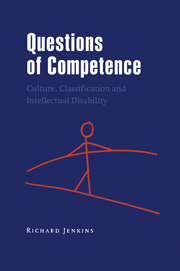Book contents
- Frontmatter
- Contents
- List of contributors
- 1 Culture, classification and (in)competence
- 2 Mental disability in the United States: an interactionist perspective
- 3 (In)competence in America in comparative perspective
- 4 Risk, resilience and competence: parents with learning difficulties and their children
- 5 Constructing other selves: (in)competences and the category of learning difficulties
- 6 Work, opportunity and culture: (in)competence in Greece and Wales
- 7 Slow cookers and madmen: competence of heart and head in rural Uganda
- 8 States and categories: indigenous models of personhood in northwest Greenland
- 9 Learning to become (in)competent: children in Belize speak out
- 10 Towards a social model of (in)competence
- Bibliography
- Index
6 - Work, opportunity and culture: (in)competence in Greece and Wales
Published online by Cambridge University Press: 16 January 2010
- Frontmatter
- Contents
- List of contributors
- 1 Culture, classification and (in)competence
- 2 Mental disability in the United States: an interactionist perspective
- 3 (In)competence in America in comparative perspective
- 4 Risk, resilience and competence: parents with learning difficulties and their children
- 5 Constructing other selves: (in)competences and the category of learning difficulties
- 6 Work, opportunity and culture: (in)competence in Greece and Wales
- 7 Slow cookers and madmen: competence of heart and head in rural Uganda
- 8 States and categories: indigenous models of personhood in northwest Greenland
- 9 Learning to become (in)competent: children in Belize speak out
- 10 Towards a social model of (in)competence
- Bibliography
- Index
Summary
‘Competence’ and ‘incompetence’ are categories defined culturally as well as by individual ability or disability. Culture here means the combination of social organisation (institutions) and norms and values characterising a particular society. Culture influences who is classified as (in)competent, and the consequences of that classification. These consequences may be far-reaching and extend to many areas of everyday life. Ultimately, the personhood of people classified as (in)competent is influenced by both their individual ability/disability and by their cultural classification. In this chapter I will look at:
Who are the people classified as (in)competent and how and why does this classification take place?
What is their place in society?
In what ways does culture influence their selection and their lives?
The historical record is clear that ‘mental retardation’ – what is also known as ‘learning difficulties’ – has existed in all cultures and societies in one form or another, though its definition, diagnosis and treatment have varied according to the philosophical, political and economic climate (Edgerton 1970; Manion and Bersani 1987: 231). To explore this variety further I studied two societies, Greece and Wales: the island of Ániksi and the small town of Ffynnon. These communities differ from each other in a number of ways; I have concentrated on economic and social structures, and norms and values.
Ániksi and Ffynnon
Ániksi is an island off the coast of Greece. A car ferry makes the journey to the mainland four times daily.
- Type
- Chapter
- Information
- Questions of CompetenceCulture, Classification and Intellectual Disability, pp. 125 - 152Publisher: Cambridge University PressPrint publication year: 1999



